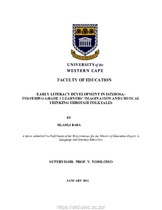| dc.contributor.advisor | Nomlomo, V | |
| dc.contributor.author | Bara, Mlamli | |
| dc.date.accessioned | 2021-03-31T09:52:28Z | |
| dc.date.available | 2021-03-31T09:52:28Z | |
| dc.date.issued | 2021 | |
| dc.identifier.uri | http://hdl.handle.net/11394/8096 | |
| dc.description | Magister Educationis - MEd | en_US |
| dc.description.abstract | This study investigated the use of folktales in enhancing literacy development among Grade 3 isiXhosa-speaking learners in one Western Cape primary school. It was inspired by my quest to explain the low literacy performance levels of Foundation Phase learners, especially those taught through the medium of African languages. Although learners are taught in their mother-tongue in this phase, the reported national literacy results do not reflect this educational advantage. Education reports continually indicate low literacy levels in the Annual National Assessments (ANAs). Underdeveloped literacy skills are likely to have a negative impact on the child’s academic progress throughout and beyond the schooling years. This study focused on the use of folktales in fostering imaginative and critical thinking as folktales present language in its natural state. They are regarded as the best tool for whole language and literacy development. Folktales are central to the indigenous knowledge system (IKS) which is an educational and cultural tool that exposes children to oral literacy, even before they acquire literacy My enquiry is premised on the idea that technology should not replace the indigenous knowledge that may be acquired through folktales. Instead, deeper sustainable research into the role of folktales in children’s acquisition of indigenous knowledge is of paramount importance for generating creative and analytical responses and for understanding the role of folktales in young children’s education. For these reasons this study applied qualitative research methodology to investigate how teachers make use of folktales to enhance Grade 3 learners’ literacy skills in isiXhosa. It drew on Sociocultural Theory to explore their pedagogical strategies in this endeavour.The findings show that folktales are oral epistemic tools which may be utilised to foster a learnercentred approach that promotes learners’ ability to grasp ideas. The study concludes that folktales are instruments of pedagogical, social and cultural knowledge which may be used across the curriculum. | en_US |
| dc.language.iso | en | en_US |
| dc.publisher | University of the Western Cape | en_US |
| dc.subject | Folktale, Early Literacy | en_US |
| dc.subject | Oral Literacy | en_US |
| dc.subject | Imagination | en_US |
| dc.subject | Critical thinking | en_US |
| dc.subject | Foundation Phase | en_US |
| dc.subject | IsiXhosa | en_US |
| dc.subject | Indigenous Knowledge Systems | en_US |
| dc.title | Early literacy development in IsiXhosa: Fostering grade 3 learners’ imagination and critical thinking through folktales | en_US |
| dc.rights.holder | University of the Western Cape | en_US |

